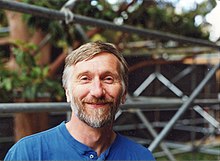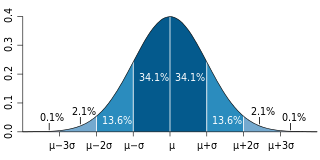
In probability theory and related fields, a stochastic or random process is a mathematical object usually defined as a family of random variables in a probability space, where the index of the family often has the interpretation of time. Stochastic processes are widely used as mathematical models of systems and phenomena that appear to vary in a random manner. Examples include the growth of a bacterial population, an electrical current fluctuating due to thermal noise, or the movement of a gas molecule. Stochastic processes have applications in many disciplines such as biology, chemistry, ecology, neuroscience, physics, image processing, signal processing, control theory, information theory, computer science, and telecommunications. Furthermore, seemingly random changes in financial markets have motivated the extensive use of stochastic processes in finance.

Béla Bollobás FRS is a Hungarian-born British mathematician who has worked in various areas of mathematics, including functional analysis, combinatorics, graph theory, and percolation. He was strongly influenced by Paul Erdős from the age of 14.

Albert Nikolayevich Shiryaev is a Soviet and Russian mathematician. He is known for his work in probability theory, statistics and financial mathematics.

Wendelin Werner is a German-born French mathematician working on random processes such as self-avoiding random walks, Brownian motion, Schramm–Loewner evolution, and related theories in probability theory and mathematical physics. In 2006, at the 25th International Congress of Mathematicians in Madrid, Spain he received the Fields Medal "for his contributions to the development of stochastic Loewner evolution, the geometry of two-dimensional Brownian motion, and conformal field theory". He is currently Rouse Ball professor of Mathematics at the University of Cambridge.

Michel Pierre Talagrand is a French mathematician. Doctor of Science since 1977, he has been, since 1985, Directeur de Recherches at CNRS and a member of the Functional Analysis Team of the Institut de mathématiques de Jussieu in Paris. Talagrand was also a faculty member at The Ohio State University for more than fifteen years. Talagrand was elected as correspondent of the Académie des sciences of Paris in March 1997, and then as a full member in November 2004, in the Mathematics section. In 2024, Talagrand received the Abel Prize.

Peter Gavin Hall was an Australian researcher in probability theory and mathematical statistics. The American Statistical Association described him as one of the most influential and prolific theoretical statisticians in the history of the field. The School of Mathematics and Statistics Building at The University of Melbourne was renamed the Peter Hall building in his honour on 9 December 2016.

Jean-François Le Gall is a French mathematician working in areas of probability theory such as Brownian motion, Lévy processes, superprocesses and their connections with partial differential equations, the Brownian snake, random trees, branching processes, stochastic coalescence and random planar maps. He received his Ph.D. in 1982 from Pierre and Marie Curie University under the supervision of Marc Yor. He is currently professor at the University of Paris-Sud in Orsay and is a senior member of the Institut universitaire de France. He was elected to French academy of sciences, December 2013.
Bálint Tόth is a Hungarian mathematician whose work concerns probability theory, stochastic process and probabilistic aspects of mathematical physics. He obtained PhD in 1988 from the Hungarian Academy of Sciences, worked as senior researcher at the Institute of Mathematics of the HAS and as professor of mathematics at TU Budapest. He holds the Chair of Probability at the University of Bristol and is a research professor at the Alfréd Rényi Institute of Mathematics, Budapest.
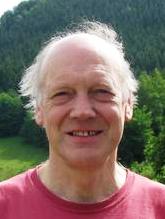
Geoffrey Richard Grimmett is an English mathematician known for his work on the mathematics of random systems arising in probability theory and statistical mechanics, especially percolation theory and the contact process. He is the Professor of Mathematical Statistics in the Statistical Laboratory, University of Cambridge, and was the Master of Downing College, Cambridge, from 2013 to 2018.

Sourav Chatterjee is an Indian Bengali mathematician from West Bengal, specializing in mathematical statistics and probability theory. Chatterjee is credited with work on the study of fluctuations in random structures, concentration and super-concentration inequalities, Poisson and other non-normal limits, first-passage percolation, Stein's method and spin glasses. He has received a Sloan Fellowship in mathematics, Tweedie Award, Rollo Davidson Prize, Doeblin Prize, Loève Prize, and Infosys Prize in mathematical sciences. He was an invited speaker at the International Congress of Mathematicians in 2014.
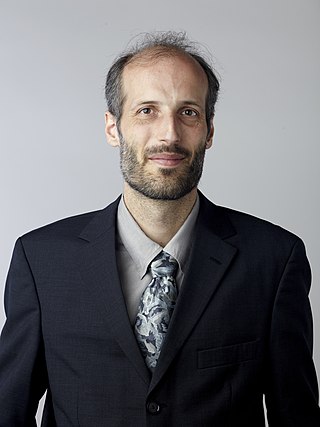
Sir Martin Hairer is an Austrian-British mathematician working in the field of stochastic analysis, in particular stochastic partial differential equations. He is Professor of Mathematics at EPFL and at Imperial College London. He previously held appointments at the University of Warwick and the Courant Institute of New York University. In 2014 he was awarded the Fields Medal, one of the highest honours a mathematician can achieve. In 2020 he won the 2021 Breakthrough Prize in Mathematics.
Ruth Jeannette Williams is an Australian-born American mathematician at the University of California, San Diego where she holds the Charles Lee Powell Chair as a Distinguished Professor of Mathematics. Her research concerns probability theory and stochastic processes.
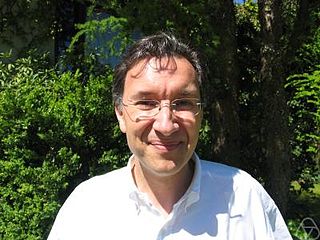
Alain-Sol Sznitman is a French and Swiss mathematician who works as a professor of mathematics at ETH Zurich. His research concerns probability theory and mathematical physics. Within the field of percolation theory, Sznitman introduced the study of random interlacements.

Ofer Zeitouni is an Israeli mathematician, specializing in probability theory.

Frank den Hollander is a Dutch mathematician.
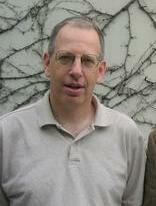
Amir Dembo is an Israeli-American mathematician, specializing in probability theory. He was elected a member of the National Academy of Sciences in 2022, and of the American Academy of Arts and Sciences in 2023.

Stanislav Alexeyevich Molchanov is a Soviet and American mathematician.

Friedrich Götze is a German mathematician, specializing in probability theory, mathematical statistics, and number theory.
Russell David Lyons is an American mathematician, specializing in probability theory on graphs, combinatorics, statistical mechanics, ergodic theory and harmonic analysis.

Erwin Bolthausen is a Swiss mathematician, specializing in probability theory, statistics, and stochastic models in mathematical physics.
